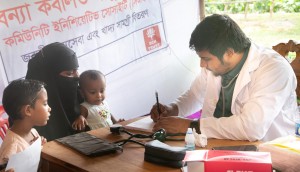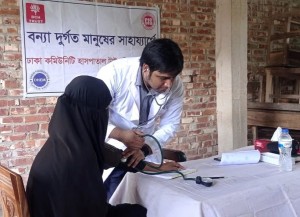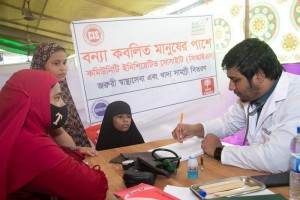【A-PAD Bangladesh】 Staff Interview CIS Dr. Nazmul
2025.03.30
At A-PAD, staff with diverse backgrounds and expertise are working to leverage their respective strengths. In this installment of our staff interview series, we interviewed Dr. Nazmul Hussain, an emergency health officer at Community Initiative Society (CIS), a network organization that works with A-PAD Bangladesh.

Q. Please tell us what led you to start working at A-PAD.
A. After graduating from Dhaka Community Medical College (Faculty of Medicine), I applied for a position as a medical officer in the field of disaster prevention at Dhaka Community Hospital Trust (DCHT), and was hired.
Q. Please tell us about your past and present work responsibilities.
A. As a Disaster Prevention Medical Officer at DCHT, I worked on the utilization of mobile medical apps and fire fighting apps, and served as a mentor for the Children Food Shop to improve the nutritional status of children. In 2018 and from 2020 to 2022, I was in charge of the emergency health sector as a project staff member in Bagerhat District, one of the bases of A-PAD Bangladesh’s National Platform (NPF). Furthermore, from 2022 to 2024, I served as the project manager of a health center in the Rohingya refugee camp under a partnership with a Malaysian NGO. After the center was closed, I am currently back with A-PAD’s NPF project as an emergency health officer at the coordination center in Dhaka.
Q. What is rewarding about your work?
A. All of my current work is related to public health issues. In my third year of the MBBS (Bachelor of Medicine, Bachelor of Surgery) program at university, I studied community medicine, focusing on public health, health promotion, prevention, epidemiology, and social health development. In class, I had the opportunity to visit the field, communicate with people, collect and analyze data, and present it as a report. At that time, my interest in the field of public health was sparked by the field visit, and that is why I chose my current workplace.
Q. What challenges do you face in your work? How do you overcome difficult challenges?
A. When I first started working, it was difficult to communicate with the local people. People living in slums tend to demand tangible support such as food and money. However, our support does not include free medicine, except in emergencies.
However, when we started offering free health checkups at the coordination center, many people came to understand our role and began to cooperate with us even in emergencies.
We sometimes experience difficulties in our interactions with external parties. Our daily activities are carried out with the permission of the government’s NGO Bureau and local governments, but we sometimes receive harsh criticism regarding legal documents and official permits. Therefore, we invite local community leaders to the coordination center to provide opportunities for activity tours and briefings, and encourage their understanding and participation in our activities. We strive to build good relationships with local governments in order to smoothly carry out our activities.
Q. Finally, do you have any words you would like to share?
A. The NPF project focuses on DRR (Disaster Risk Reduction) and disaster management, while addressing disaster prevention and health issues in parallel. I believe that disasters are not limited to natural disasters but also include pandemics (infectious disease outbreaks), for example.
If there is a role related to health issues in the future, I would definitely like to be involved. I will strive to play a more active role in order to make this project even more impactful.






